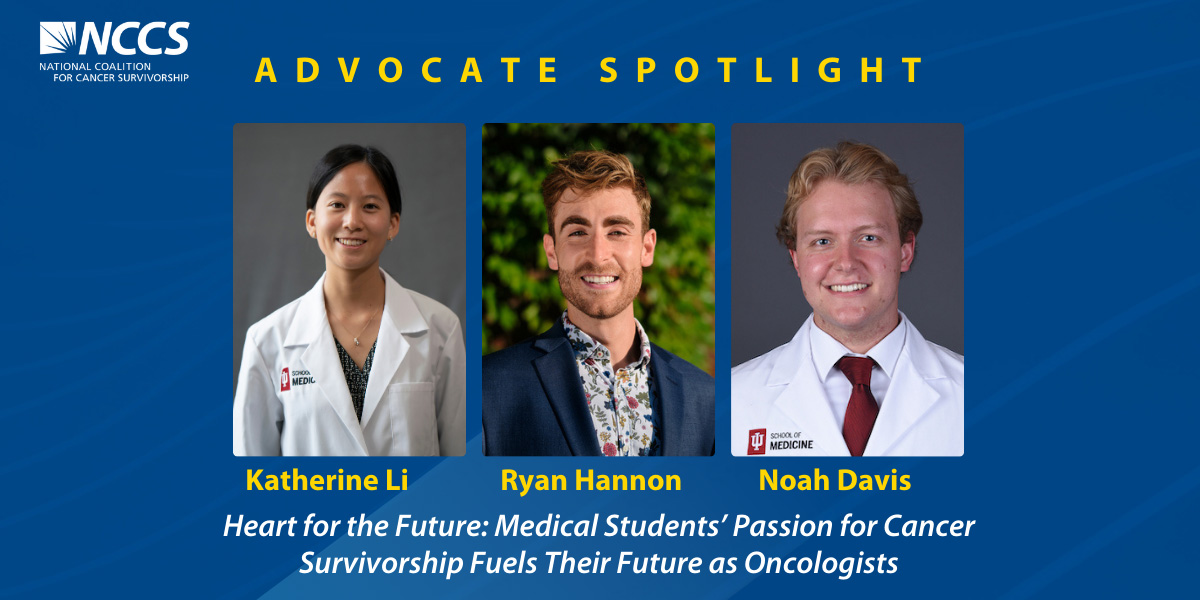Heart for the Future: Medical Students’ Passion for Cancer Survivorship Fuels Their Future as Oncologists
Advocate Spotlight: Katherine Li, Ryan Hannon, and Noah Davis
Katherine Li, Ryan Hannon, and Noah Davis aren’t your average medical students. While they come to the profession like so many others, with a genuine desire to provide quality medical care to their future patients; these young professionals already know they will pursue oncology as their specialty. United by their participation in the prestigious CUPID program (Cancer in the Under-Privileged, Indigent or Disadvantaged), an annual summer program hosted at Johns Hopkins University in partnership with Indiana and Ohio State Universities, and open to 2nd-year medical students, these future oncologists exemplify the transformative power of education, advocacy, and a profound commitment to improving the lives of those affected by cancer.
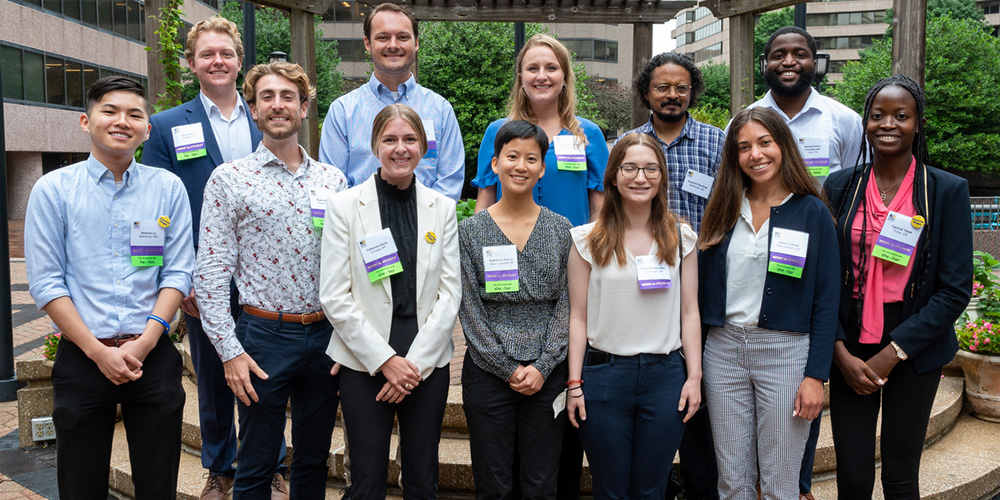
Katherine, Ryan, and Noah were among the CUPID program participants at the 2022 NCCS CPAT Symposium.
Each of these CUPID students came to study medicine via different paths. In high school, Katherine Li found a love of chemistry and biology, and knew she’d pursue a STEM-focused career. “After shadowing and doing research with a hematologist the summer after my freshman year of college, I knew that medicine was the right path,” she said. Ryan Hannon’s choice to become an oncologist became apparent to him in grade school, after suffering the loss of a close friend and his grandfather, both to cancer. He recalls, “The tragic and untimely deaths of both my grandfather and my friend Nick were the primary reason why I considered pursing medicine. I recall my feelings of helplessness and loss, which drove me to learn more about cancer and how I could help those with this diagnosis.” For Noah Davis, the decision to pursue a medical degree came from his desire to serve others while working in a fast-paced team environment. “I’ve always enjoyed hearing people’s life stories, and as a physician I get to hear about who they were before they got sick and who they wish to be going forward. The privilege of becoming a doctor is the ability to be with them at their lowest point and work with them to make the best out of their situation,” he said.
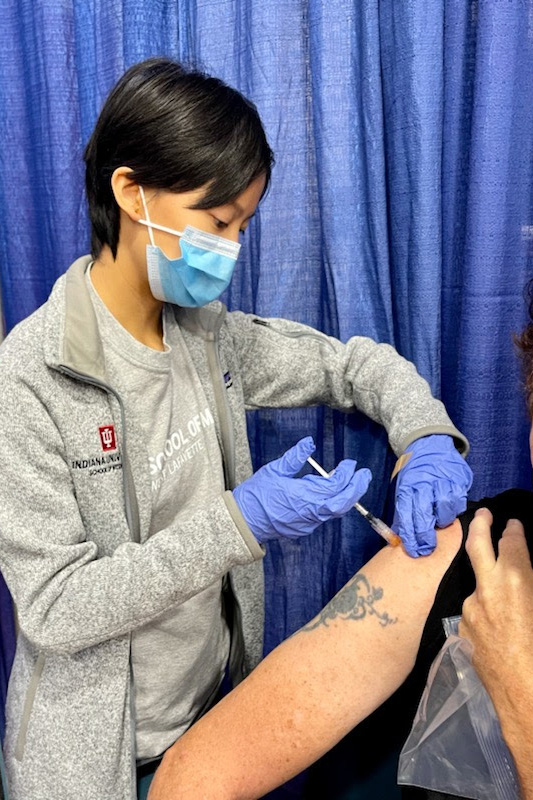 While the CUPID program exposed Katherine, Ryan, and Noah to cancer research and clinical care, they all came to cancer advocacy through NCCS and the collaboration between CUPID and NCCS’s Cancer Policy and Advocacy Team (CPAT) program. “CPAT was the first time I ever engaged with cancer advocacy,” Katherine reflects, highlighting the pivotal role that NCCS played in shaping her advocacy journey. “I met many passionate advocates, and it was a privilege to hear their perspectives on the health care system and their experiences with their oncologists. The experience really cemented my interest and passion for oncology, and I am so grateful to NCCS for organizing such an impactful event.” Katherine’s dedication to advocacy extends beyond CPAT; she connected with NCCS staff after the CPAT Symposium to bring a cancer survivorship and advocacy panel to the Indiana University School of Medicine students, fostering a culture of engagement and awareness.
While the CUPID program exposed Katherine, Ryan, and Noah to cancer research and clinical care, they all came to cancer advocacy through NCCS and the collaboration between CUPID and NCCS’s Cancer Policy and Advocacy Team (CPAT) program. “CPAT was the first time I ever engaged with cancer advocacy,” Katherine reflects, highlighting the pivotal role that NCCS played in shaping her advocacy journey. “I met many passionate advocates, and it was a privilege to hear their perspectives on the health care system and their experiences with their oncologists. The experience really cemented my interest and passion for oncology, and I am so grateful to NCCS for organizing such an impactful event.” Katherine’s dedication to advocacy extends beyond CPAT; she connected with NCCS staff after the CPAT Symposium to bring a cancer survivorship and advocacy panel to the Indiana University School of Medicine students, fostering a culture of engagement and awareness.
For Ryan, advocacy is a continuum of his work in medical care. His engagement with NCCS began with the CPAT Symposium in 2022. He was so moved by his experiences learning with and from cancer survivors that he was determined to return for the 2023 CPAT Symposium, where he not only participated but also contributed to a panel on Improving Doctor-Patient Communication. Reflecting on the experience, he shares, “The patient journey does not stop after the ‘cure’! There is so much work that needs to be done to better understand and meet the needs of cancer patients at all stages of their diagnosis. Each story, treatment journey, and hard-earned lesson shared by the advocates at CPAT was priceless and eye-opening. The medical system can do so much more to support this community.”
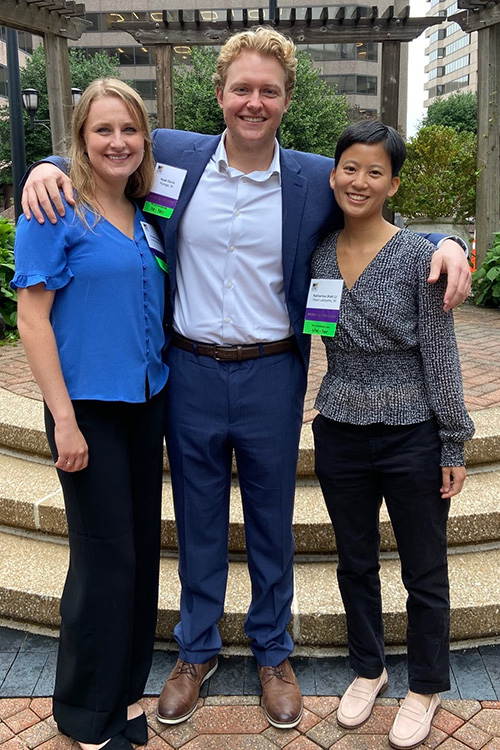 Noah, equally committed to advocacy, emphasizes the frustration that health care professionals often feel when bureaucracy hinders optimal patient care. Advocacy, for him, is the avenue to push against those hindrances. “It can be frustrating when rules and regulations keep us from providing the care we would like to provide,” he notes. “Advocacy and policy work allow one to push against those rules that are hurting our patients. We all want the absolute best care for our patients, and advocacy is an avenue to ensure we are able to freely give the best care possible.” As these budding oncologists continue to make strides in their advocacy efforts, they view their connection to NCCS as a guiding force, empowering them to navigate the complex landscape of health care policy and ensuring that their voices resonate for the benefit of cancer patients nationwide.
Noah, equally committed to advocacy, emphasizes the frustration that health care professionals often feel when bureaucracy hinders optimal patient care. Advocacy, for him, is the avenue to push against those hindrances. “It can be frustrating when rules and regulations keep us from providing the care we would like to provide,” he notes. “Advocacy and policy work allow one to push against those rules that are hurting our patients. We all want the absolute best care for our patients, and advocacy is an avenue to ensure we are able to freely give the best care possible.” As these budding oncologists continue to make strides in their advocacy efforts, they view their connection to NCCS as a guiding force, empowering them to navigate the complex landscape of health care policy and ensuring that their voices resonate for the benefit of cancer patients nationwide.
For Katherine, Ryan, and Noah, advocacy and quality patient care are intertwined. They want other medical students to understand the importance of engaging in advocacy work, alongside their learning and future medical practice. “As future physicians, we are in a position where we will have specialized knowledge of a field that many policymakers do not,” Katherine emphasizes. “I see advocacy as an extension of patient care. Through advocacy, we can ensure that patients are getting the care they need and improve their outcomes.” Her advice for aspiring advocates echoes the sentiment that health care professionals play a crucial role in influencing policies and practices, bridging the gap between theoretical knowledge and the practical needs of patients.
Ryan, drawing from his multifaceted experiences in research and patient care, shares invaluable advice for those considering advocacy work. “Your experiences and stories carry weight,” he emphasizes. “We are at the front lines of medical care in this country, and we see its failings first hand. Our perspectives and propositions are valued in policy talks. Trust yourself and your experiences – raising your voice could lead to systemic change and better healthcare for all.” His words reflect not only the significance of individual narratives but also the collective impact that medical professionals can have in shaping the healthcare landscape.
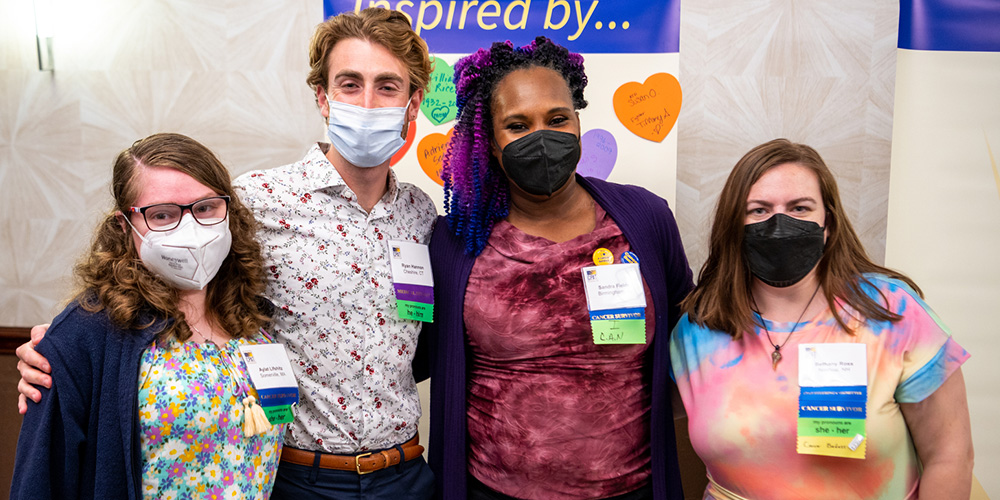
Noah, cognizant of the initial challenges that newcomers may face in the advocacy realm, offers practical advice for those venturing into this domain. “It can be quite daunting and there’s a large learning curve when you first start getting involved in advocacy,” he acknowledges. “However, most of the people involved have dedicated a large part of their life to their advocacy work, thus they are a fountain of knowledge and often are passionate about teaching newcomers. It is certainly challenging and uncomfortable at times but the ability to help such a large group of people is rare and extremely rewarding.” Their collective wisdom reflects a profound understanding of the impact that compassionate advocacy can have on the trajectory of cancer care.
As these future oncologists chart their paths, the horizon holds promise and commitment. Katherine envisions specializing in hematology/oncology after medical school, continuing her advocacy locally and nationally, focusing on addressing disparities in cancer care. Ryan remains dedicated to direct patient care, contemplating a future in pediatric oncology. His commitment to understanding and addressing disparities in accessing quality palliative care echoes his research endeavors. Noah, with aspirations in malignant hematology or thoracic oncology, foresees pursuing internal medicine and hematology/oncology fellowships. As they forge ahead, their shared commitment to advocacy and quality patient care becomes a beacon for aspiring medical professionals.
One thing is clear; Katherine, Ryan, and Noah share a collective commitment to advocating for quality cancer care, to recognizing and addressing disparities, and to celebrating survivorship. Their experiences, education and exposure to advocacy has fueled their passion to provide quality cancer care and advocate for the needs of the cancer survivors they’ll serve.
Learn more and Join the NCCS Cancer Policy & Advocacy Team »

